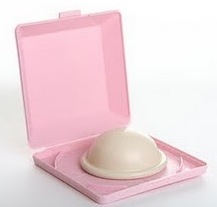March 11th, 2011 by Peggy Polaneczky, M.D. in Better Health Network, Opinion
1 Comment »


If ever a medical device company crossed a line with their marketing, this one has. Essure, which makes a sterilization device for women, is trying to scare men away from vasectomy in order to drive women to use their device.
“We made men watch footage of an actual vasectomy,” says the female voiceover — and then they proceed to show men’s reactions to watching a surgical procedure, with “That’s frickin’ gross, man” being the most memorable quote. The final tagline: “You can only wait so long for him to man up.” Yeah, and to be sure he doesn’t, they’ve created this ad.
The ad is slimy, harmful, obnoxious, and just plain stupid. A couple’s decision as to which sterilization procedure is best for them should be one informed by real information, not frat-boy marketing.
How dare they? The FDA should pull this ad — now.
**********
Addendum: I just emailed the FDA at BadAd@fda.hhs.gov. Feel free to copy my message below and send your own email:
To the FDA,
I find this ad for Essure both inflammatory and unethical. I am incensed at the impact this ad could have on couples’ informed choices about sterilization. I ask that you mandate that the company who makes Essure immediately pull this ad, both from the Web and from any media outlet where it’s playing.
Thank you for your attention to this matter.
*This blog post was originally published at The Blog That Ate Manhattan*
March 10th, 2011 by Harriet Hall, M.D. in Opinion, Research
No Comments »

A new article in the Journal of Women’s Health by Westhoff, Jones, and Guiahi asks “Do New Guidelines and Technology Make the Routine Pelvic Examination Obsolete?”
The pelvic exam consists of two main components: The insertion of a speculum to visualize the cervix and the bimanual exam where the practitioner inserts two fingers into the vagina and puts the other hand on the abdomen to palpate the uterus and ovaries. The rationales for a pelvic exam in asymptomatic women boil down to these:
- Screening for chlamydia and gonorrhea
- Evaluation before prescribing hormonal contraceptives
- Screening for cervical cancer
- Early detection of ovarian cancer
None of these are supported by the evidence. Eliminating bimanual exams and limiting speculum exams in asymptomatic patients would reduce costs without reducing health benefits, allowing for better use of resources for services of proven benefit. Pelvic exams are necessary only for symptomatic patients and for follow-up of known abnormalities. Read more »
*This blog post was originally published at Science-Based Medicine*
May 1st, 2010 by Peggy Polaneczky, M.D. in Better Health Network, Health Tips, News, Opinion
No Comments »

 After a prolonged hiatus, during which diaphragms became as scarce as Elaine’s treasured sponges, the Ortho All Flex diaphragm is back, and it’s now latex-free.
After a prolonged hiatus, during which diaphragms became as scarce as Elaine’s treasured sponges, the Ortho All Flex diaphragm is back, and it’s now latex-free.
The over one-year (at least in my area) shortage happened as the manufacturer transitioned from the old latex to new silicone diaphragms, and suppliers everywhere began backordering this important barrier contraceptive. Read more »
*This blog post was originally published at The Blog that Ate Manhattan*
April 2nd, 2010 by Nancy Brown, Ph.D. in Better Health Network, Health Tips, Humor
No Comments »


People, people, people: If you don’t understand how birth control works, you shouldn’t be having sex. What happened to the old days when the boyfriend was expected to sit through the video and conversation about all the types of birth control during the appointment at Planned Parenthood?
A friend sent me a link to the funniest video of men (trying to) explain how birth control works — it’s worth viewing for the laughs. These are all adult men who have some serious misconceptions about how birth control works, but “lady business” as a euphemism for vagina may become part of my vocabulary!
It’s no wonder that the United States has some of the highest rates of teen pregnancy and sexually transmitted infections — our youth are ignorant about how to prevent them. Please talk to your teens about birth control.
Remember that the teens who know the most about sexuality tend to be the ones who don’t have sex. How’s that for motivation to talk to your teens?
Photo credit: nateOne
This post, Birth Control: How Men Think It Works, was originally published on
Healthine.com by Nancy Brown, Ph.D..





 After
After 









